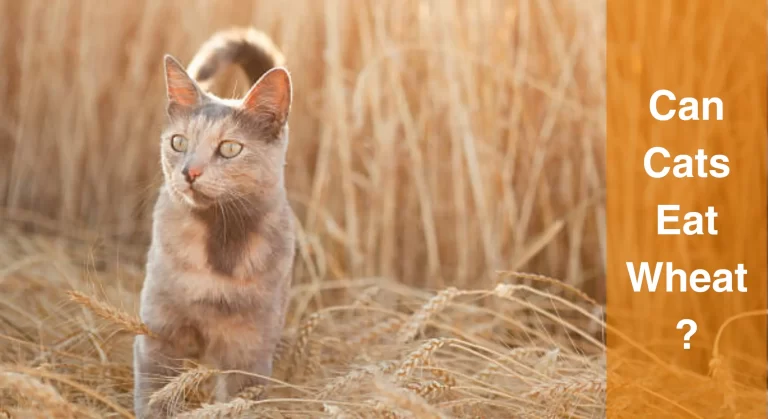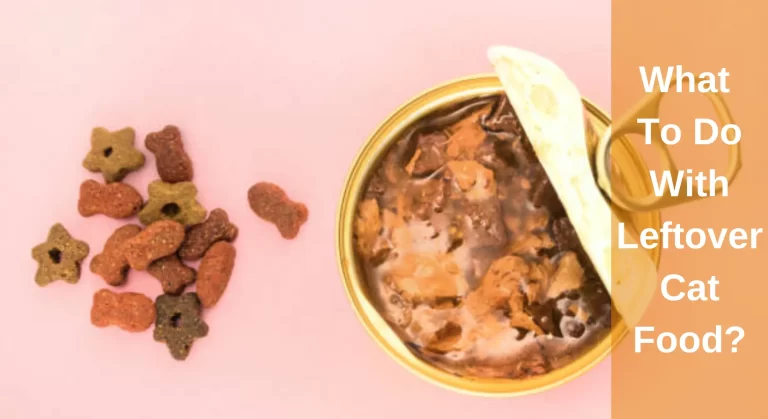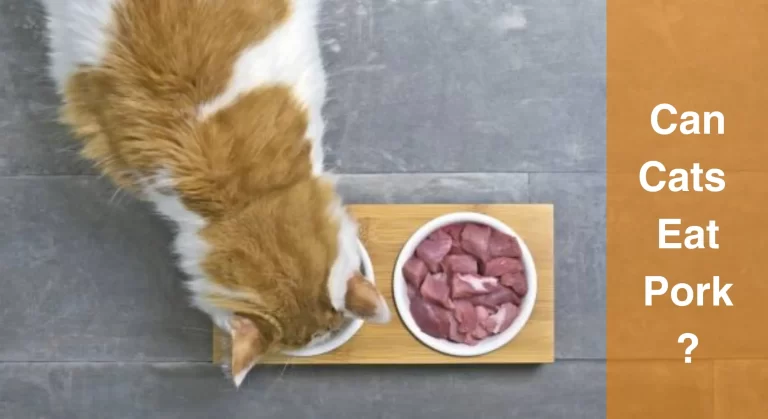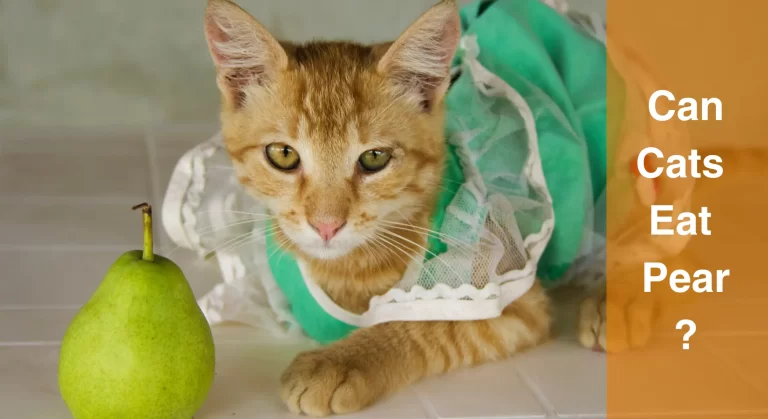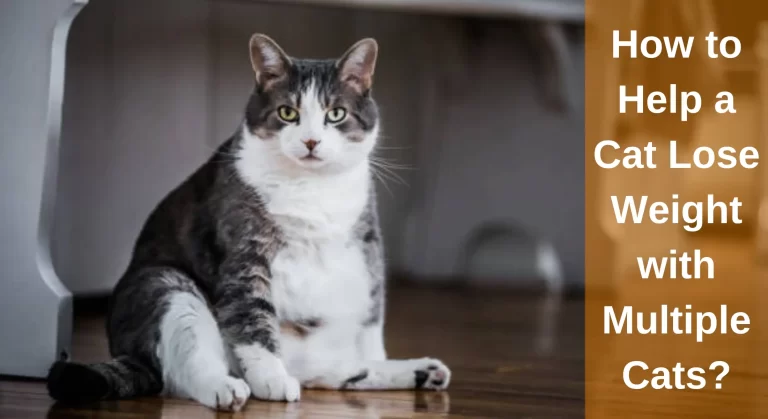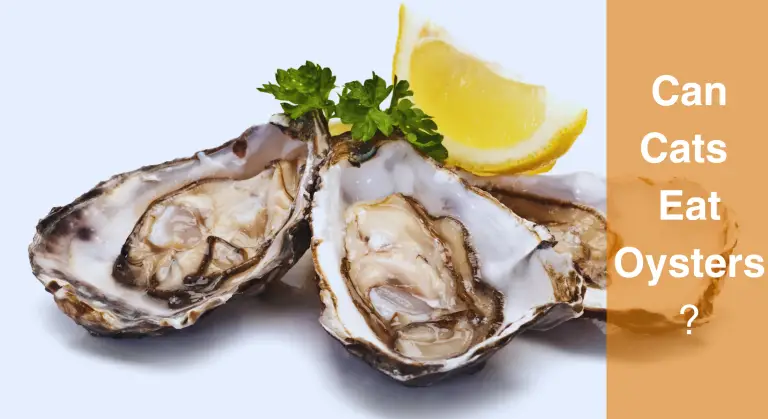Can Cats Eat Biscuits? Everything You Need to Know About Cats and Biscuits
One of the most popular breakfast meals in the USA is the biscuit. They are a multipurpose snack because as can be eaten sweet or savory and maybe crispy or thick. If you like biscuits, you might have thought about whether your cat will enjoy a piece of your morning biscuit with you. “Can Cats Eat Biscuits?”
Technically, cats can eat biscuits, but it is not recommended to make it a regular part of their diet as it is not overly healthy for them. Biscuits are full of empty calories and may contain ingredients and flavourings that can be harmful to cats, such as flour, salt, butter, chocolate, raisins, or certain spices. Moreover, the biggest risk of consuming biscuits in excess is that they’ll gain weight, gets diabetic, have cardiac disease, and many other health issues.
We are aware of how challenging it may be to refrain from feeding your furry friend. Their begging looks and purring are at an entirely different level of deception! So, in today’s article, we’ll explore the composition of biscuits, whether they’re good or bad for cats, how many they can consume, varieties of biscuits, alternatives to biscuits, and much more!
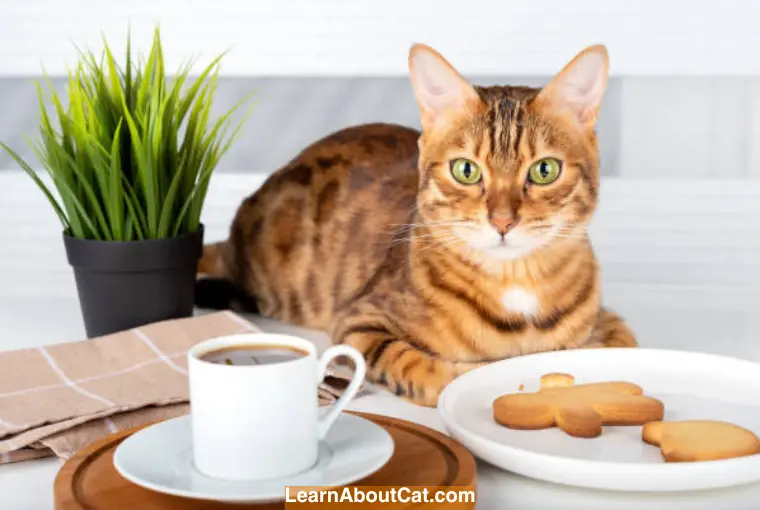
What Are Biscuits?
Biscuits are a popular human snack made of flour, salt, butter, and a leavening agent such as baking powder. They are often enjoyed with tea or coffee and come in various flavours and shapes. Some biscuits may also contain vegetable shortening, additives, flavourings, and artificial colours
Can Cats Eat Human Biscuits?
Technically speaking Yes, cats may consume biscuits in moderation without suffering any health effects. However, it isn’t advised to give your cats biscuits since they include salt, sugar, dairy, and margarine.
Vegetable margarine, additives, flavourings, and artificial colours are all possible ingredients in certain biscuits.
All of these components are unhealthy for your cat, even though they aren’t usually toxic.
Although, certain chemicals can hurt your cat’s health, particularly if they are ingested in abundance.
Cats enjoy eating the meals that their owners do. They won’t stop looking at you till you give them a bite to eat. Some of the snacks that cats like to take from their humans are biscuits.
Despite the potential risks, many cat owners choose to give their pets biscuits as an occasional treat. If you decide to do so, be sure to choose biscuits that are free from toxic ingredients like raisins or chocolate. Additionally, it’s important to keep in mind that biscuits should never replace your cat’s regular diet, which should consist mainly of high-quality cat food.
Also, Check Out: Can Cats Eat Cake?
Are Biscuits Good for Cast?
Although biscuits can be given to cats in balance, they’re not normally suggested as a cat diet. Even though they might not be dangerous by nature, biscuits mustn’t be a major component of your cat’s meal.
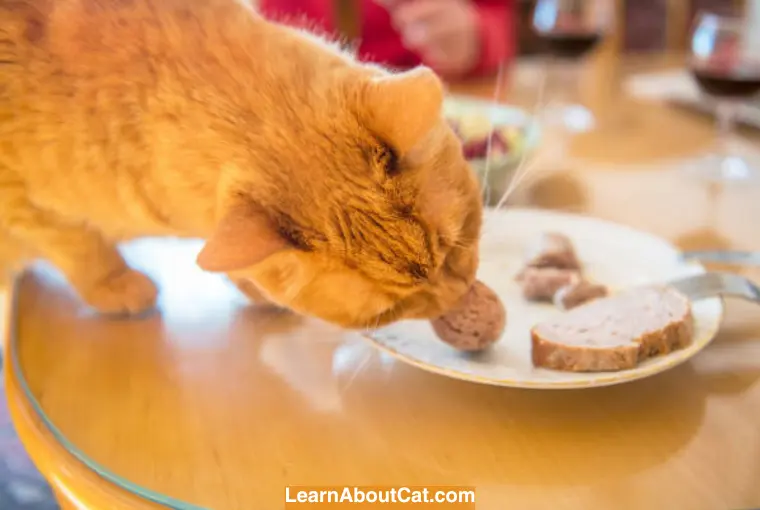
The issue with biscuits is also that they contain a lot of unnecessary calories that will cause your cat to gain weight.
Carbs can eventually reduce your cat’s dietary supply. Therefore, refrain from constantly feeding them biscuits.
Cats require a diet consisting mostly of meat, which provides them with the necessary nutrients to maintain their health. Biscuits, on the other hand, are not nutritionally balanced for cats and have a high sugar content, which is unnecessary for their diet. Therefore, biscuits should not be considered a good source of nutrition for cats.
Find Out: Can Cats Eat Doritos?
Are Biscuits Bad for Cast?
Biscuits are not necessarily bad for cats, but they should not be consumed frequently or make up a significant part of a cat’s diet.
Since biscuits are frequently filled with fat and starch, they may eventually cause cats’ digestive systems to become upset.
Moreover, the majority of cats don’t have the enzymes required to digest and absorb nutrients from refined carbohydrates such as those present in biscuits.
Biscuits are frequently served alongside salty snacks like sauces or foods containing a lot of salt. Cats can suffer a great deal from high salt levels.
Moreover, biscuits don’t offer the same nutrient advantages as foods like poultry and seafood that are better suited for cats. Moreover, biscuits contain unhealthy toppings or additives which may truly hurt your cat.
You Might Like to Find: My Cat Ate A Chocolate Chip: Will 1 Chocolate Chip Hurt a Cat
Composition of Human Biscuits and Its Effect on Feline’s Health
Let’s start by discussing all ingredients of biscuits.
The majority of biscuits share the same components (flour, salt, butter, and a leavening agent like baking powder), although biscuits from the shop may include more additives than homemade biscuits.
We’ll concentrate on biscuits you can prepare at home as it’s tough to consider all the varieties available in stores.
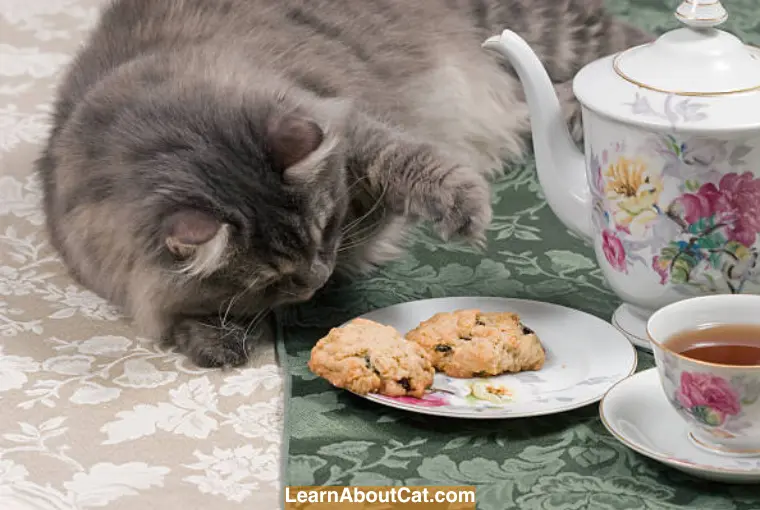
Flour
Flour is the primary component in biscuits. Around 2 cups of flour are required for most recipes.
Although flour is typically included in goods that are toxic for cats, it is not always hazardous for cats.
Carbohydrates, which cats don’t require in their nutrition, are typically associated with flour. Diets are calorie-void, and cats cannot convert carbohydrates into usable energy.
The quantity of flour in biscuits must be greatly reduced for them to be suitable for cats, or your cat can only eat a limited amount without negatively affecting the balance of their nutrition.
Check Out: Can Cats Eat Flour? What You Need To Know
Sugar
You will find roughly a 1⁄2 cup of sugar in the biscuit dough, which is another essential element in biscuits.
Sugar is not recommended for cats. Furthermore, despite the fact that they may exhibit little interest, cats can never taste sugar. Your cat will gain weight if they consume too many sweets. A biscuit is similar to a cookie in this way, other food that cats shouldn’t consume.
Weight gain in cats can cause serious problems like cardiovascular disease, breathing difficulties, diabetes, gastritis, and even urinary disorders.
Salt
The bread you bake at home, especially biscuits, frequently contains salt. Overall, there isn’t much salt in biscuits—about a teaspoon—but it’s vital to remember that salt is bad for cats.
Cats’ food shouldn’t contain a lot of salt. Cats require significantly less salt than us because they are shorter than us. As a result, they’ll get salt poisoning which is a life-threatening situation.
Milk
1⁄2 or 1 cup of milk is added to each Milk Biscuit. Depending on the sort of milk you choose, most of you either add whole dairy or 2% milk.
Cats mustn’t drink milk since they are allergic to milk, despite the fact that you may think they enjoy it.
The tiniest bit of milk might cause a cat’s tummy to become upset. Avoid tempting your cat’s gastrointestinal tract, particularly if they don’t typically drink milk.
Also Read: Can Cats Drink Oat Milk?
Butter
For making butter biscuits airy, a small quantity of butter is typically used. Butter is an oil (fat), which means it’s also unhealthy for cats.
Oils shouldn’t be consumed by cats since they might experience stomach pain. Butter and other oils can both cause diarrhoea and even puking.
Intresting Reading: Can Cats Eat Canola Oil?
When Can Cats Eat Biscuits?
When you are certain that the ingredients of biscuits won’t harm your cat, cats can consume them. Although the list of substances found in biscuits is short, some of these ingredients have the likelihood of giving your cat a tummy ache. When these components are present together, your cat’s intestines may become ill.
Also, your cats are aware of your cat’s tolerance for butter and dairy products. The little quantity of milk or butter you’ve previously provided your cat won’t make them ill.
You can offer your cat a few bits of your biscuits because you are aware that such ingredients won’t necessarily make it ill.
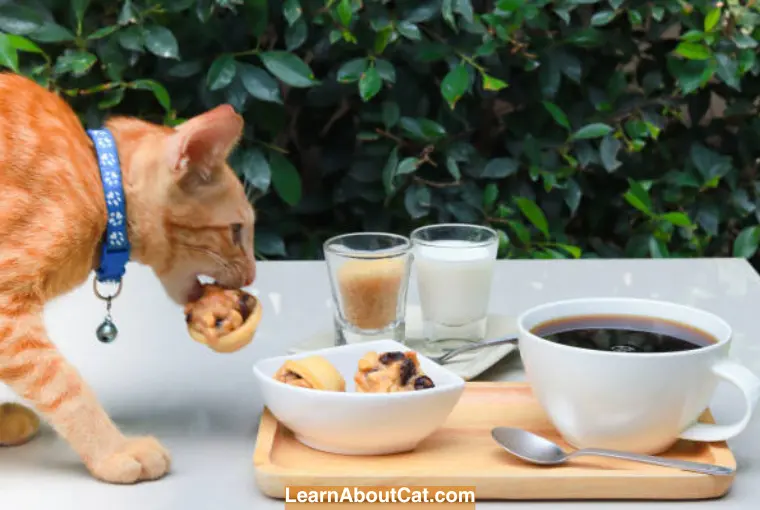
How Many Biscuits Can My Cat Eat?
If you have to give biscuits to your cat, you must give her just a limited quantity and ensure it did not contain any toxic ingredients.
While a tiny piece of a biscuit won’t hurt your cat, giving her an entire biscuit will make her sick. Each day, your fluffy cat needs roughly 120–180 calories.
Yet, a single biscuit has about 50 calories. Cats will need to take adequate nutrition to satisfy their dietary requirements because the majority of these calories are useless. As a result, your cat will become obese if she starts to consume it regularly.
Potential Risks of Feeding Biscuits to Cats
Feeding biscuits to your cat may seem like a harmless treat, but it can lead to potential risks that can harm your cat’s health. Here are some potential risks you should be aware of:
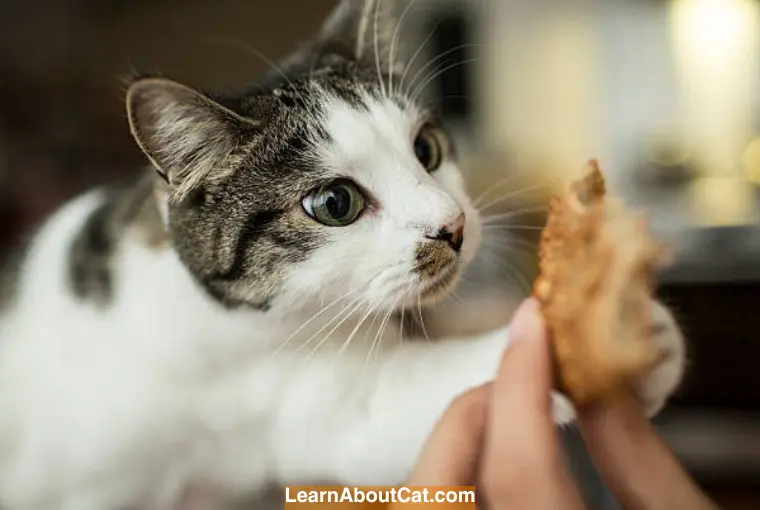
Obesity
Feeding biscuits to your cat can lead to weight gain and obesity. Most biscuits are high in fat and carbohydrates, which can cause your cat to gain weight quickly.
Obesity can lead to other health problems, such as diabetes, high blood pressure, heart disease, arthritis, and chronic pain syndrome.
To prevent obesity, it’s important to monitor your cat’s diet and provide them with a balanced, healthy diet.
Digestive Issues
Most cats lack the enzymes necessary to break down and extract nutrition from complex carbohydrates like those found in biscuits.
Feeding biscuits to your cat can lead to digestive issues in the long run. Biscuits are often high in starch and fat, which can lead to digestive issues such as constipation, diarrhoea, and vomiting.
Additionally, biscuits are often served with salty food, such as gravy, which can lead to dehydration and other health problems.
Allergic Reactions
Feeding biscuits to your cat can cause allergic reactions. Biscuits often contain ingredients such as gluten, yeast, and milk, which can cause allergic reactions in some cats.
Symptoms of an allergic reaction can range from mild to severe and can include vomiting, diarrhoea, itching, and difficulty breathing.
If you notice any of these symptoms after feeding your cat biscuits, it’s important to stop feeding them biscuits and seek veterinary care immediately.
How Can I Feed Cat’s Specific Biscuits to My Cat?
If you want to feed your cat specific biscuits, it is important to choose biscuits that are specifically formulated for cats.
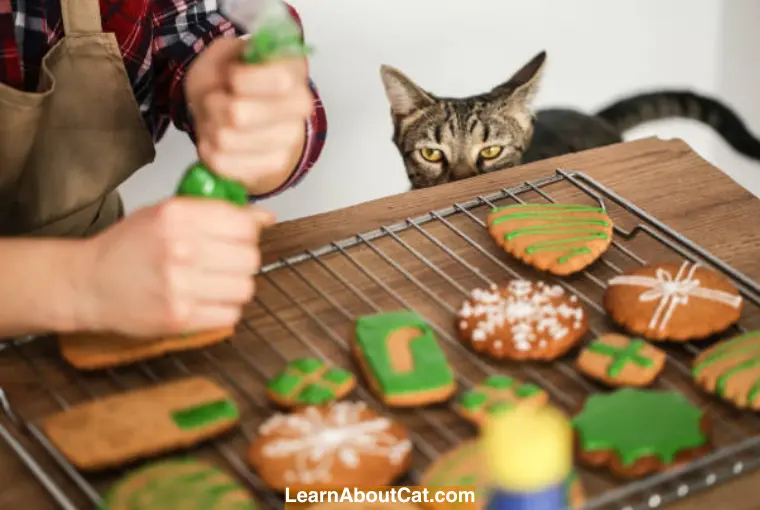
When given in the proper amounts, cat-specific biscuits are safe. These biscuits are designed to meet the nutritional needs of cats and often contain high-quality protein, vitamins, and minerals that are essential for their health.
Offer biscuits as a reward for good behaviour or as a way to bond with your cat, but avoid overfeeding them.
You can also use biscuits as a way to encourage your cat to be more active. Place the biscuits in puzzle feeders or scatter them around the house to encourage your cat to engage in more physical activity and mental stimulation.
How much food your cat requires each day will depend on its calorie requirements. These demands are affected by a variety of factors:
A few elements that affect calorie requirements are:
- Age range
- Gender identity
- Daily activity
- Health (for example, pregnancy, illness)
- Dietary objectives (weight reduction or weight gain
Feeding guidelines are typically printed on the product you chose for your cat or on the item itself.
If your cat consumes a kibble-based meal, make sure you follow a feeding guide. Never give cats biscuits more than 10% of their caloric intake.
It is important to consult with a veterinarian before introducing any new foods or treats into your cat’s diet to ensure they are getting the appropriate nutrition and to check for any potential allergies or sensitivities.
Can Cats Eat Sugar Biscuits?
Sugar biscuits should not be given to cats since they’re not a natural component of their diet and may cause health problems.
A diet that is strong in proteins and free of carbohydrates is necessary for cats. Sugary foods can cause diabetes, tooth disorders, being overweight, and other medical conditions in cats. You may notice nausea, diarrhoea, and pain if your cat consumes sugar.
The severity of the symptoms will rely on how delicate your cat is as well as what she consumes
Can Cats Just Eat Dry Biscuits?
Although dry biscuits may serve as a portion of a cat’s meal, it isn’t advised to feed them only dry biscuits.
Due to the absence of several nutrients necessary for feline fitness, dry biscuits themselves can give cats full and nutritious nutrition.
Although, eating dry biscuits helps people minimize dental conditions like gingivitis by removing debris from their teeth.
But moderation is strictly advised otherwise the high carbohydrate content and calories of dry biscuits will make your cats severely ill.
Can Cats Eat Chocolate Biscuits?
No, cats should not eat chocolate biscuits. For humans, chocolate biscuits make delicious midnight snacks. But, in the case of your cats, it isn’t the same case. Providing chocolate might create complications for your cat.
Theobromine and caffeine, which are the two primary components of chocolate, are poisonous to cats. When theobromine reaches blood circulation, it causes convulsions, an elevated temperature, and a rapid heartbeat.
Moreover, caffeine is also harmful to cats. Hence, if your cat experiences chocolate toxicity, you may need to schedule a vet visit.
Can Cats Eat Raisins Biscuits?
Raisins are bad for the health of cats due to their high sugar content in this. Providing raisin biscuits in excess to your cats can result in kidney or liver damage and may rise blood sugar levels.
Although it is currently unclear, the hazardous chemical may potentially be more harmful than chocolate. So, it is recommended to avoid giving your cats raisins biscuits.
Can Cats Eat Savory Biscuits?
Certain savory biscuit varieties are particularly harmful to cats. These biscuits frequently have a lot of salt as well as other flavourings, which can wreak havoc on a cat’s sensitive gastrointestinal tract.
It’s vital to be aware of the ingredients of the biscuits you give cats since in some situations, these flavourings may even be hazardous to them.
Garlic and shallots have chemicals that can seriously impair cats’ well-being. The poisons can harm the cat’s kidneys and RBCs, which can result in anaemia.
These poisons can be deadly to cats in extreme circumstances. Owners must be careful to prevent shallots and garlic from cats, and you must consult a vet straightaway if their cat eats either of these items.
Avoid feeding your cat savory biscuits until you know what’s inside or you’ve cooked it by yourself.
Can Cats Eat Peanut Butter Biscuits
Cats can technically eat peanut butter biscuits in moderation, but it is not recommended as a regular part of their diet. Peanut butter itself is not toxic to cats, and some cats may even enjoy the taste.
However, Veterinarians usually recommend not giving your cats any foodstuff that includes peanut butter.
Because peanut butter is full of fatty contents that may harm your cat’s stomach if consumed in bulk.
Moreover, biscuits are a dangerous food for cats since they include additional substances in addition to peanut butter.
Additionally, some cats may be allergic to peanuts or other ingredients in the biscuit, which can cause adverse reactions such as itching, swelling, and gastrointestinal upset.
Intresting Reading: Can Cats Drink Buttermilk?
Alternatives to Biscuits
There are substitutes for giving your cat biscuits.
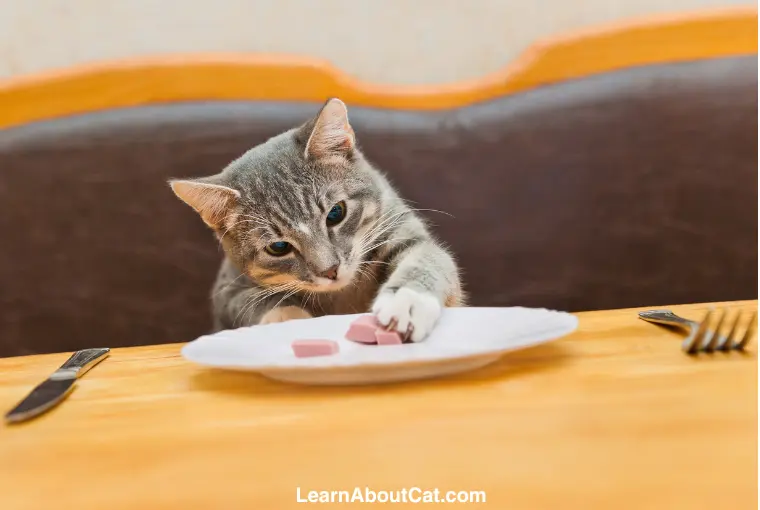
Grilled chicken, grilled fish, and tiny portions of roasted beef are all tasty cat treats. All of these protein-rich snacks support a cat’s overall health and fitness.
Cats also enjoy modest portions of raw broccoli or bean sprouts as well as other crunchy foods such as freeze-dried snacks made of chicken or meat.
Avoid overfeeding your cat because it could result in excess weight. Instead, try to offer a nutritious diet that satisfies each cat’s specific nutritional requirements.
If your cat is accustomed to following you while you bake, you can reward him with a cat snack while he waits.
Although you are feeding your cat food specifically made for her, your cat may believe that you are feeding him the food you’re consuming.
You can prepare biscuits designed specifically for cats. These recipes omit elements that could be dangerous for your cat.
To select a food that you believe your cat will like, you can search through recipes online. One thing to keep in mind is that you shouldn’t teach your cat new routines.
Frequently Asked Question
Can kittens eat biscuits?
You shouldn’t give your kitten biscuits the way you offer to your cat. Growing kittens need to eat well every day in order to develop strong bones, epidermis, brains, and other critical systems of their sensitive body.
When can kittens eat biscuits?
Unless kittens reach the age of 4-6 months old, biscuits shouldn’t be fed to them because they don’t include proteins, fat, and other essential nutrients. But after reaching this age, kittens can begin to eat a wider variety of foods including biscuits as a snack.
Is it OK to give cats dog biscuits?
While feeding your cat dog biscuits won’t necessarily harm their health, it won’t be helpful either. It has minerals that a dog is deficient in. The only advice is to offer your cat healthy cat food and treats, which are healthy and advantageous for them.
What are good snacks for cats?
Cooked meat, chicken, fish, cat kibbles, and some fruits or vegetables are perfect snacks for your cats. All these snacks are a perfect source of protein. But must be given in moderation and doesn’t constitute a major part of their diet.
Conclusion
Although biscuits are a snack that your cat is probably going to enjoy, it is recommended that you refrain from them because they are unhealthy for cats. Cats are not provided with many essential nutrients from biscuits. Overindulging in biscuits might result in obesity, which comes with associated health issues.
There are some other considerations. Raisin and chocolate biscuits should not be consumed as cats are poisoned by both of these additives. If you want your cat to enjoy some savory biscuits, keep in mind that the biscuits or the gravy don’t contain any shallots or garlic.
Generally, giving your cat biscuits as a snack is not recommended. You can either make your cat-friendly cookies and snacks or purchase some healthier options such as cat kibbles. Also, meats, seafood, and vegetables that have been cooked simply are the ideal snacks to give your cat.
Related Posts:
Who is Isabella?
My name is Isabella, and I am a dedicated and knowledgeable cat enthusiast. With years of experience caring for cats and a deep love for felines, I made a mission to help other cat lovers navigate the challenges of cat ownership.

